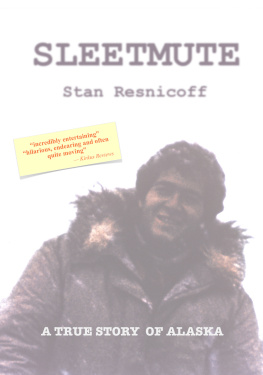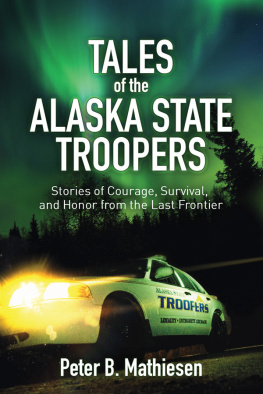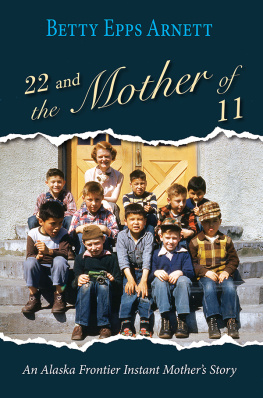
Thank you for buying this
St. Martins Press ebook.
To receive special offers, bonus content,
and info on new releases and other great reads,
sign up for our newsletters.

Or visit us online at
us.macmillan.com/newslettersignup
For email updates on the author, click here.
The author and publisher have provided this e-book to you for your personal use only. You may not make this e-book publicly available in any way. Copyright infringement is against the law. If you believe the copy of this e-book you are reading infringes on the authors copyright, please notify the publisher at: us.macmillanusa.com/piracy.
To the women in my family. All of them are warriors. Sharon, Debbie, Laura, Julie, Mackenzie, Sara, Kaylee, Toni, Jacquie, Dana, Leslie, Katie, Joan, Jerrie, Liz, Courtney, and Stephanie.
And to Braden, our newest adventurer.
Nature never deceives us;
it is always we who deceive ourselves.
J EAN -J ACQUES R OUSSEAU

That spring, rain fell in great sweeping gusts that rattled the rooftops. Water found its way into the smallest cracks and undermined the sturdiest foundations. Chunks of land that had been steady for generations fell like slag heaps on the roads below, taking houses and cars and swimming pools down with them. Trees fell over, crashed into power lines; electricity was lost. Rivers flooded their banks, washed across yards, ruined homes. People who loved each other snapped and fights erupted as the water rose and the rain continued.
Leni felt edgy, too. She was the new girl at school, just a face in the crowd; a girl with long hair, parted in the middle, who had no friends and walked to school alone.
Now she sat on her bed, with her skinny legs drawn up to her flat chest, a dog-eared paperback copy of Watership Down open beside her. Through the thin walls of the rambler, she heard her mother say, Ernt, baby, please dont. Listen and her fathers angry leave me the hell alone .
They were at it again. Arguing. Shouting.
Soon there would be crying.
Weather like this brought out the darkness in her father.
Leni glanced at the clock by her bed. If she didnt leave right now, she was going to be late for school, and the only thing worse than being the new girl in junior high was drawing attention to yourself. She had learned this fact the hard way; in the last four years, shed gone to five schools. Not once had she found a way to truly fit in, but she remained stubbornly hopeful. She took a deep breath, unfolded, and slid off the twin bed. Moving cautiously through her bare room, she went down the hall, paused at the kitchen doorway.
Damn it, Cora, Dad said. You know how hard it is on me.
Mama took a step toward him, reached out. You need help, baby. Its not your fault. The nightmares
Leni cleared her throat to get their attention. Hey, she said.
Dad saw her and took a step back from Mama. Leni saw how tired he looked, how defeated.
II have to go to school, Leni said.
Mama reached into the breast pocket of her pink waitress uniform and pulled out her cigarettes. She looked tired; shed worked the late shift last night and had the lunch shift today. You go on, Leni. You dont want to be late. Her voice was calm and soft, as delicate as she was.
Leni was afraid to stay and afraid to leave. It was strangestupid, evenbut she often felt like the only adult in her family, as if she were the ballast that kept the creaky Allbright boat on an even keel. Mama was engaged in a continual quest to find herself. In the past few years, shed tried EST and the human potential movement, spiritual training, Unitarianism. Even Buddhism. Shed cycled through them all, cherry-picked pieces and bits. Mostly, Leni thought, Mama had come away with T-shirts and sayings. Things like, What is, is, and what isnt, isnt. None of it seemed to amount to much.
Go, Dad said.
Leni grabbed her backpack from the chair by the kitchen table and headed for the front door. As it slammed shut behind her, she heard them start up again.
Damn it, Cora
Please, Ernt, just listen
It hadnt always been this way. At least thats what Mama said. Before the war, theyd been happy, back when theyd lived in a trailer park in Kent and Dad had had a good job as a mechanic and Mama had laughed all of the time and danced to Piece of My Heart while she made dinner. (Mama dancing was really all Leni remembered about those years.)
Then Dad went off to Vietnam and got shot down and captured. Without him, Mama fell apart; that was when Leni first understood her mothers fragility. They drifted for a while, she and Mama, moved from job to job and town to town until they finally found a home in a commune in Oregon. There, they tended beehives and made lavender sachets to sell at the farmers market and protested the war. Mama changed her personality just enough to fit in.
When Dad had finally come home, Leni barely recognized him. The handsome, laughing man of her memory had become moody, quick to anger, and distant. He hated everything about the commune, it seemed, and so they moved. Then they moved again. And again. Nothing ever worked out the way he wanted.
He couldnt sleep and couldnt keep a job, even though Mama swore he was the best mechanic ever.
That was what he and Mama were fighting about this morning: Dad getting fired again.
Leni flipped up her hood. On her way to school, she walked through blocks of well-tended homes, bypassed a dark woods (stay away from there), passed the A&W where the high school kids hung out on weekends, and a gas station, where a line of cars waited to fill up for fifty-five cents a gallon. That was something everyone was angry about these daysgas prices.
As far as Leni could tell, adults were edgy in general, and no wonder. The war in Vietnam had divided the country. Newspapers blared bad news daily: bombings by Weatherman or the IRA; planes being hijacked; the kidnapping of Patty Hearst. The massacre at the Munich Olympics had stunned the whole world, as had the Watergate scandal. And recently, college girls in Washington State had begun to disappear without a trace. It was a dangerous world.
She would give anything for a real friend right now. It was all she really wanted: someone to talk to.
On the other hand, it didnt help to talk about her worries. What was the point of confession?
Sure, Dad lost his temper sometimes and he yelled and they never had enough money and they moved all the time to distance themselves from creditors, but that was their way, and they loved each other.
But sometimes, especially on days like today, Leni was afraid. It felt to her as if her family stood poised on the edge of a great precipice that could collapse at any second, crumble away like the houses that crashed down Seattles unstable, waterlogged hillsides.
* * *
A FTER SCHOOL , Leni walked home in the rain, alone.
Her house sat in the middle of a cul-de-sac, on a yard less tended than the rest: a bark-brown rambler with empty flower boxes and clogged gutters and a garage door that didnt close. Weeds grew in clumps from the decaying gray roof shingles. An empty flagpole pointed accusingly upward, a statement about her fathers hatred of where this country was headed. For a man whom Mama called a patriot, he sure hated his government.
She saw Dad in the garage, sitting on a slanted workbench beside Mamas dented-up Mustang with the duct-taped top. Cardboard boxes lined the interior walls, full of stuff they hadnt yet unpacked from the last move.
Next page


















